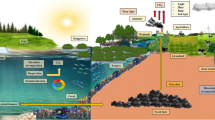
Overview
- Demonstrates the role of microbes in improving soil fertility and function
- Assists members of the crop and plant sciences community to keep abreast of the developments in microbial technologies
- Focuses on different ecological applications of microbial groups
- Includes supplementary material: sn.pub/extras
Buy print copy
About this book
This two-volume work is a testament to the increasing interest in the role of microbes in sustainable agriculture and food security. Advances in microbial technologies are explored in chapters dealing with topics such as plant-microbe interactions, rhizoremediation and cyanoremediation, and bio-immobilization. Volume II is a collection of research findings that invites readers to examine the application of microbes in pollution reduction, decontamination of agro- and aquatic ecosystems, and remediation of various toxic compounds. Highly readable entries attempt to close the knowledge gap between soil microbial associations and sustainable agriculture.
Traditional agricultural management techniques have relied heavily on application of chemical fertilizers and pesticides; and recent land use change practices have led to over exploitation of natural resources. Strategies outlined here simplify a complicated picture of the way microbial communities can improve the quality of environment and eliminate food scarcity in the coming generations. This work is a significant contribution to research in this increasingly important discipline of soil sciences, and will appeal to researchers in microbiology, agriculture, environmental sciences, and soil and crop sciences.Similar content being viewed by others
Keywords
Table of contents (12 chapters)
-
Front Matter
-
Back Matter
Editors and Affiliations
About the editors
Dr. Gamini Seneviratne is a research professor at the National Institute of Fundamental Studies in Kandy, Sri Lanka.
Bibliographic Information
Book Title: Agro-Environmental Sustainability
Book Subtitle: Volume 2: Managing Environmental Pollution
Editors: Jay Shankar Singh, Gamini Seneviratne
DOI: https://doi.org/10.1007/978-3-319-49727-3
Publisher: Springer Cham
eBook Packages: Earth and Environmental Science, Earth and Environmental Science (R0)
Copyright Information: Springer International Publishing AG 2017
Hardcover ISBN: 978-3-319-49726-6Published: 22 February 2017
Softcover ISBN: 978-3-319-84225-7Published: 15 July 2018
eBook ISBN: 978-3-319-49727-3Published: 15 February 2017
Edition Number: 1
Number of Pages: XIII, 257
Number of Illustrations: 9 b/w illustrations, 16 illustrations in colour
Topics: Soil Science & Conservation, Agriculture, Microbial Ecology, Sustainable Development, Ecosystems, Environmental Chemistry



